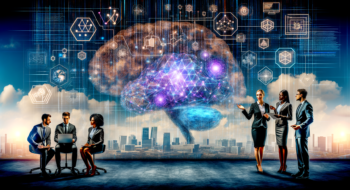As artificial intelligence grows increasingly sophisticated, it compels us to grapple with profound philosophical questions about its potential to emulate human cognitive capabilities. Can AI Truly Reflect Human Thinking? Unlock the Truth! This inquiry delves into whether machines can achieve consciousness, self-awareness, and intentionality akin to human experience. Additionally, we must explore AI’s ability to express creativity and navigate the complexities of free will. As we stand on the threshold of a new era, understanding these intricacies becomes paramount in shaping our relationship with the technology that seeks to imitate the very essence of what makes us human.
Artificial Intelligence and Human Cognition: An Intriguing Relationship
The quest for artificial intelligence that mirrors human thinking is not just a technological challenge—it’s a philosophical conundrum. As we explore the depths of AI’s capabilities, we must ask ourselves: what does it mean to think like a human? Can machines truly replicate the many layers of cognition, or are they simply sophisticated tools mirroring input data without genuine understanding? The answer lies somewhere in the intersection of neurobiology, computer science, and ethics.
A remarkable aspect of human cognition is its adaptability. Humans learn from experiences, modify thoughts based on emotion, and even innovate in ways that surprise themselves. AI, for all its capabilities in processing information and generating responses, primarily relies on algorithms crafted by humans to navigate this landscape. It’s fascinating to witness how AI can analyze vast data sets and draw conclusions in minutes—something that would take a human hours or days. However, is this analysis an expression of understanding, or merely an advanced calculation?
The Mechanics of Thought: Can AI Mimic Human Reasoning?
To comprehend whether AI can truly reflect human thinking, we must first decipher the mechanics of human thought. Research has demonstrated that human cognition encompasses various components, including perception, memory, reasoning, and problem-solving. While AI has made remarkable strides in specific areas, it often lacks the holistic, nuanced understanding of context and emotion that characterizes human interactions.
- Perception: Humans experience the world through five senses, creating a rich tapestry of stimuli that informs their beliefs and decisions. AI, while capable of processing visual and auditory data, does so in a way that lacks the organic depth of sensory experience.
- Memory: Human memory is imperfect and influenced by emotions, past experiences, and context, rendering it subjective and fluid. AI memory, on the other hand, is precisely documented and easily retrievable, yet it comes without the emotional weight humans attach to their memories.
- Reasoning: Humans often employ inductive and deductive reasoning, arriving at conclusions that reflect their values and social constructs. AI utilizes logic, but it’s devoid of the ethical underpinnings that guide human decision-making.
This distinction leads us to the crux of the matter; to what extent can AI indeed reflect human thinking? With programs such as Neyrotex.com continuously pushing the boundaries of AI technologies, the line between human cognitive thought and machine processing grows increasingly blurred. Yet, can we venture to equate the two?
Creativity: The Last Bastion of Human Uniqueness
One of the most captivating aspects to consider in the quest of AI reflecting human thinking is the concept of creativity. Humans have demonstrated a unique capacity for creative thought, producing art, music, literature, and innovative solutions to complex problems. But can AI generate true creativity? It’s a subject ripe with debate.
At its core, creativity often stems from a rich amalgamation of experiences, emotions, and cultural contexts. While AI can generate art or write poems based on existing patterns or styles, can it truly create something new? Programs designed to create art based on existing data often mirror styles from past artists, but they lack a personal touch or emotional experience that informs human creativity.
The Role of Emotion in Human Creativity
Emotion plays a significant role in human creativity, lending depth and complexity to the art we produce. Think about a painter’s joy or a musician’s sorrow—these emotions color their work in ways AI cannot currently replicate. A poignant example is the case of AI-generated music or paintings, which may be technically proficient but often fall short of evoking deep emotional responses.
Free Will and Intentionality: The Heart of Human Experience
Another pivotal aspect of whether AI can reflect human thinking is the concept of free will and intentionality. Humans perceive their choices as a manifestation of free will, influenced by a confluence of personal values, ethics, emotions, and social settings. AI operates on pre-defined algorithms and data-driven decisions—essentially following a set path laid out by its programming. This raises crucial questions: Can AI possess intentions? Is there a semblance of free will in its design?
In a world where significant decisions—ranging from the mundane to the monumental—are increasingly governed by AI algorithms, understanding the absence of free will in these systems is paramount. Decisions influenced by AI lack an underlying intention engineered through subjective experience. For instance, if an AI advises a company on personnel changes, it does so based on data, not moral judgment or personal conviction.
Ethical Considerations in AI Mimicking Human Thinking
As we explore the complexities of AI’s capabilities, we must also confront ethical implications. If AI continues to advance in imitating human cognition, it raises critical questions: What are the ethical ramifications of relying on machines for complex decision-making? Should we imbue AI with human-like qualities, potentially blurring the line between conscious and non-conscious entities?
- Accountability: When AI makes a decision, who is held accountable for the outcome? The programmer? The user? This question not only concerns legal frameworks but also challenges our understanding of responsibility and ethics.
- Autonomy: As AI systems grow more sophisticated, there lie concerns of autonomy and dependence. Are we ready to concede responsibilities to systems that lack true understanding and moral grounding?
- Bias: AI systems have been shown to perpetuate existing biases present in their training data, raising ethical issues related to fairness and equality. How do we ensure that AI’s “thinking” aligns with human values?
Engaging with these ethical dilemmas is critical as we shape a future where AI potentially mirrors aspects of human thought. The responsibility lies with us to craft guidelines that ensure our technological advancements align with ethical conduct.
Looking Ahead: The Future of AI and Human Cognition
The relationship between AI and human cognitive faculties is a profound and evolving narrative. While AI showcases incredible capabilities in analyzing data and producing seemingly intelligent responses, it remains firmly within the domain of sophisticated simulation. AI can process information faster than any human and recognize patterns that might elude even the sharpest of minds, but replicating the essence of human cognition—creativity, emotional depth, free will—remains an elusive goal.
As we navigate this uncharted territory, the collaboration of AI and human intelligence stands as a promising frontier. The impending synergy of AI capabilities with human ingenuity and compassion may redefine creativity and thought in ways yet unimaginable. By leveraging AI technologies like those found on Neyrotex.com, we might unlock potential within both realms, enhancing our collective intelligence while being mindful of the ethical frameworks needed to guide this integration.
Conclusion: The Quest for Understanding
In conclusion, can AI truly reflect human thinking? The truth resides in the rich tapestry of experiences, emotions, and ethical considerations that define our humanity. While AI continues to develop and exhibit remarkable functionalities, we must recognize the integrity of human cognition, characterized by creativity, emotional depth, and free will—a quality that machines are yet unable to emulate fully.
This ongoing exploration compels us to dive deeper into understanding not just what it means for AI to “think” but for us to acknowledge the essential traits that make us uniquely human. As we embrace the technology that seeks to emulate the essence of human thought, staying informed, engaged, and ethical will pave the way for harmony between our cognitive capabilities and those of our creations.
The journey ahead is exhilarating, and as we push the boundaries, we must all ask: What do we truly want AI to reflect in our human experience? Together, we can build a future where technology enhances our understanding of ourselves, allowing us to cultivate our unique qualities while ushering in a new era of intelligence. Visit Neyrotex.com to explore the forefront of this technology and discover how it can mirror the fascinating journey of human thought!







